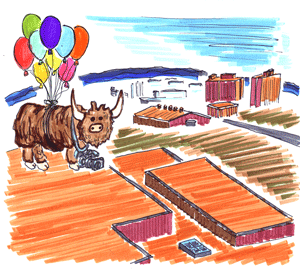The staff editorial is the majority opinion of The Murray State News Editorial Board.

“One Herd. One Love.”
This is not the catchphrase for a quirky organic milk company or a new Animal Planet show about romance in the wilderness, though it should be in the running for both.
It’s the tagline of Yik Yak, the popular college campus-based social media app known for its ability to let users post anonymously.
The app has gained its fair share of criticism since its launch in November 2013 – bloggers and journalists from The New York Times to the Huffington Post debate its merit and raise concerns about cyberbullying and hate speech. Because of its anonymity function, the capacity for offensive speech is significant. Behind the security of a phone screen and binary codes, users can speak with gall and without inhibition.
It’s easy to condemn an app like Yik Yak and its users, especially when the target audience is college students who may see their impudence as expressions of identity not to be analyzed or taken seriously.
Even Murray State is no stranger to troubling cases of bigoted Yaks; racist and sexist posts in the fall of 2014 seemed to reduce the app to a breeding ground for intolerance.
Do those instances invalidate Yik Yak as a means of communication, though? While the cons may be glaring, we cannot ignore the pros.
On a daily basis, the number of offensive messages is dwarfed in comparison to the mundane – comments about Winslow Dining Hall, mentions of the weather and jokes about college life. While not the most riveting points of discussion, those posts serve a purpose in our campus community.
The Yik Yak homepage states the app “makes the world feel small again by giving you a feed of all the casual, relatable, heartfelt and silly things people are saying around you.”
One scroll through the app will show how the qualifications for relativity or silliness vary drastically from user to user. But matters of taste aside, does the app deserve any more criticism than Snapchat, Twitter or Tumblr?
Yik Yak is a lens through which students can view their college campus – whether or not they like what they see is a separate issue.
As the mission statement says, the app provides a reel of the everyday conversations that happen on campus and can sometimes lead to deeper emotional connections.
In addition to the numerous requests for hook-ups, cuddle buddies and dates that circulate on the feed, there have also been instances of users reaching out in times of severe anxiety and depression. In these cases, users who may feel alone, socially excluded or not feel comfortable acknowledging mental health issues to friends or family can suddenly receive support and kind words from their “herd.”
Yik Yak’s FAQ page addresses the issue of suicidal posts, advising users to screenshot them for report to the system and to contact local authorities or suicide hotlines. The FAQ also has several tabs with helpful tips on how to report and resolve any other worrisome behavior, including threats, bullying, offensive language, etc.
Even if troubling posts seem to run rampant, they’re not without the acknowledgment of the app’s creators and gatekeepers. In comparison to other popular social media apps, Yik Yak has actually implemented fairly smart regulations to avoid mishaps, like prohibiting users from posting phone numbers. Anonymity, for the most part, ensures its users more protection, not harm.
While Murray State has a designated “free speech zone,” few students actually use the space on a monthly basis, much less a daily one. Students might see Yik Yak as a more accurate space for free speech than on campus, where hundreds of passersby could identify them.
The app certainly has its downfalls, as all social media platforms do. But as a space for students to find comfort, humor or stress relief, Yik Yak is undeniably valuable for young adults trying to find their herd.





























































































